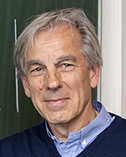
Egbert (Bert) W. Meijer
Eindhoven University of Technology
|
Primary Section: 14, Chemistry Membership Type:
International Member
(elected 2022)
|
Biosketch
E.W. "Bert" Meijer is distinguished university professor in the Molecular Sciences, professor of Organic Chemistry at the Eindhoven University of Technology, and co-director of the Institute for Complex Molecular Systems. After receiving his PhD degree at the University of Groningen with Hans Wynberg, he worked for 10 years in industry (Philips and DSM) in the field of polymer materials. In 1991 he was appointed in Eindhoven, while in the meantime he has part-time positions in Nijmegen, MPI-Mainz, and Santa Barbara, CA. Bert Meijer is known for his contributions to dendrimers, functional systems, and the development of supramolecular polymers. He is associate editor of the Journal of the American Chemical Society. Bert Meijer has received several awards and in 2020 he is knighted by the king to be Commander in the Order of the Netherlands Lion. He is an honorable member of several academies and societies, including the Royal Netherlands Academy of Science, where he is appointed to Academy Professor in 2014. Since 2022 he is also a visiting professorial fellow of the University of New South Wales in Sydney, Australia.
Research Interests
The research of the Meijer group aims at closing the gap between organic chemistry, polymer chemistry and chemical biology by making use of well-controlled supramolecular chemistry protocols. By introducing the concept of multi-step non-covalent synthesis of molecular systems from well-defined small and large molecules, it aims at synthesizing and studying artificial systems that are not known in the laboratories today and where the position of all molecules in the system are controlled with respect to time and space. Moreover, external stimuli addressing these properties to arrive at dynamic functions are investigated both experimentally and theoretically. The groups' major accomplishment is found in merging organic and polymer chemistry through novel supramolecular concepts culminating in the discovery and development of functional supramolecular polymers and materials. This field of research, in which supramolecular polymers moved from a scientific curiosity to a technologically relevant subject, is now investigated in many international academic and industrial laboratories. Next to ease in processing without losing the excellent polymer materials properties, due to the dynamic nature of supramolecular polymers, novel properties like self-healing and adjustable bioactivity became possible. Clinical trials are under way to use these supramolecular polymer materials in tissue engineering applications, most notable engineering vascular grafts.

